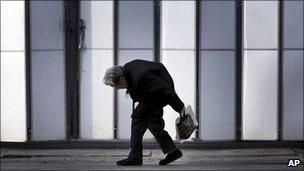The mystery of Japan's missing centenarians
- Published

A third of Japanese over 65 now live alone, according to official statistics
It was on a hot summer's day in late July that police in Japan found the mummified corpse of Sogen Kato - still lying in the bed where he had died 30 years earlier.
At 111 years old, he was believed to be Japan's oldest man. His 81-year-old daughter had hidden his death and pocketed more than 9m yen ($106,000; £68,000) in pension payments, police said.
Suspicions aroused, local governments sent out teams to check on their elderly residents.
When officials visited the home of Tokyo's reputed oldest woman, Fusa Furuya, aged 113, they discovered that she had not been seen by her daughter since the 1980s.
Japan's media has delivered a day-by-day count of the missing, prompting much national hand-wringing.
One woman who - if alive - would be 125 years old, was found to have been registered as living in a park in Kobe city.
The register in Yamaguchi prefecture indicated one of its residents was alive and kicking at 186 years old.
The nationwide hunt culminated this month with the Justice Ministry reporting more than 230,000 "missing" centenarians - a revelation that sent the country, which traditionally venerates its elderly, into collective shock.
'Deeper problems'
There are several reasons being touted to explain the staggering figure.
The first is antiquated record-keeping on the part of the notoriously unreliable family registry, which records all births and deaths, on which the 230,000 figure is based.
Japan's official oldest person Chiyono Hasega, 113, is venerated on "Respect for the Aged Day"
The Justice Ministry said some of those unaccounted for might have died as long ago as World War II, with their deaths going unreported amid the post-war turmoil.
Others might have emigrated without reporting their status to the local authorities, or relatives might simply not have reported their deaths.
The resident registry, which is based on census data and information on pensions and other welfare benefits, gives a far more accurate picture.
Those figures, released last week by the Health Ministry, recorded 44,449 living citizens aged 100 or more.
It was unable to account for about 400 people - a troubling figure for a society that prides itself on its commitment to its most senior citizens.
An editorial in the Asahi newspaper, a leading daily, spoke of the "deeper problems" thrown up by the findings.
Japan was based on the twin pillars of stable jobs and families - but both are ever less stable, exacerbating ugly elements of society.
"The families who are supposed to be closest to these elderly people don't know where they are and, in many cases, have not even taken the trouble to ask the police to search for them," read the editorial.
"The situation shows the existence of lonely people who have no family to turn to and whose ties with those around them have been severed," it said.
The case of the missing centenarians indicates a breakdown in social cohesion - in the family and the wider community, says analyst Jeff Kingston.
It used to be that parents would live with their children and grandchildren but the three-generation family, with the woman as the main care giver, is becoming an anachronism, says Mr Kingston, author of Contemporary Japan.
When Japan's economic bubble burst in 1989 it ushered in the "lost decade", which is now in its third cycle.
The economic stagnation is widely recognised, but its impact on society has been profound.
In 55% of married households both spouses now work, and women are simply overburdened, says Mr Kingston.
'Mirror to society'
Japan is growing older as its population declines. It now has the world's highest proportion of elderly with more than 20% of the population aged over 65. By 2050 this figure will be close to 40%.
The National Institute of Population and Social Security research estimates that a third of Japanese over 65 live alone.
Many also die alone - a modern phenomenon that has inspired the word kodokushi, or lonely death.
There are huge waiting lists for public care homes, but many would rather live a solitary life than be institutionalised.
This social exclusion has driven up suicide rates and crime among the elderly.
Petty crimes such as shoplifting have soared in the last decade - out of economic necessity for some; in other cases as a means of seeking attention - albeit negative.
But perhaps the most surprising element of this story is some families deliberately hiding the deaths of elderly relatives in order to claim their pensions.
Japan's health minister has suggested face-to-face meetings with all citizens over 110 years old to verify their vitality.
"It is a humanising phenomenon - the Japanese are traditionally seen as sober, law-abiding people - when they are in fact scamsters like the rest of us," says Mr Kingston.
"[The story of the missing centenarians] holds up a mirror to society and reflects realities that many in Japan do not want to accept."
- Published10 September 2010
- Published27 August 2010